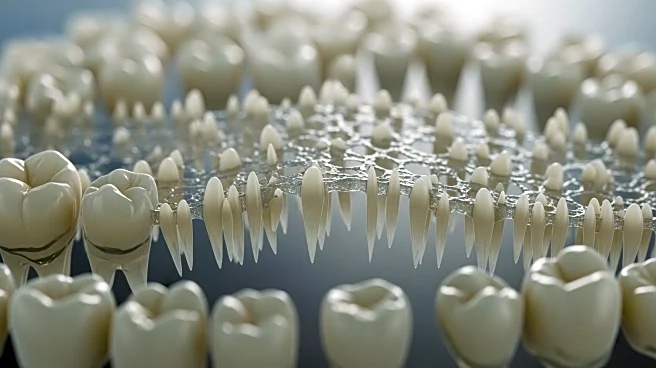What's Happening?
Researchers at King's College London, led by Ana Angelova Volponi, have made significant progress in the development of lab-grown human teeth. The team has been experimenting with lab-grown teeth for nearly two decades, initially using human and mouse
cells. Recently, they achieved a breakthrough by developing a new hydrogel scaffold that better mimics the environment where biological teeth grow. This advancement is crucial for replacing mouse cells with human cells to stimulate tooth formation. The hydrogel, developed in collaboration with Imperial College London, allows tooth-like structures to form within eight days. While challenges remain, this new material improves the interaction between cells tasked with tooth creation, moving closer to potential clinical applications.
Why It's Important?
The development of lab-grown teeth could revolutionize dental care by providing biological replacements for lost teeth. Unlike traditional implants, which can cause inflammation and lack natural elasticity, lab-grown teeth would integrate seamlessly into the jaw, offering a more natural feel and function. This advancement could reduce the need for invasive dental surgeries and improve patient outcomes. The research also highlights the potential for industrialization of tooth regeneration technology, which could lead to widespread clinical applications. As more researchers contribute to this field, the benefits of biological tooth repair or replacement could become accessible within the next decade.
What's Next?
Future steps involve solving the challenge of replacing embryonic mouse cells with adult human cells. If successful, lab-grown teeth could be integrated into everyday dentistry through two possible approaches: growing a tooth to a certain stage and embedding it into the tooth socket, or fully growing the tooth first and implanting it surgically. Researchers are also exploring antibody-based treatments and stem cell techniques to promote tooth growth. Clinical trials are underway, and advancements in this field are accelerating, suggesting that biological tooth repair or replacement could become a realistic option within the coming decade.
Beyond the Headlines
The ethical and practical implications of lab-grown teeth are significant. This technology could reduce the reliance on synthetic materials in dental care, offering a more sustainable and biocompatible solution. Additionally, the research underscores the importance of interdisciplinary collaboration in advancing regenerative medicine. As the field progresses, it may also pave the way for other regenerative applications, such as organ and tissue engineering, further transforming healthcare.


















